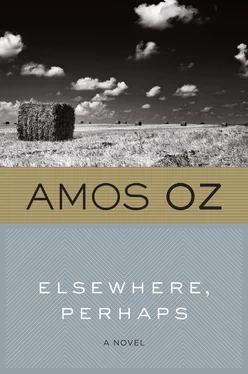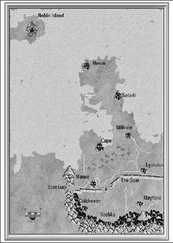At happy moments Eva used to call her daughter affectionately "Stella," and sometimes she called her "Stella Maris." There is no explanation for the addition. If we are to believe Fruma Rominov, it reflects a predilection of Eva's for charcoal-drawn seascapes: a solitary white-sailed boat on a misty horizon, waves lightly rippling, a canal lapping against greenery, all in a somewhat old-fashioned, slightly sickly taste. Some of these drawings were included in the volume of Reuven Harish's children's poems, even though they do not correspond to the subjects. But we seem to have wandered rather; we only wanted to explain the name "Stella Maris."
The kettle is boiling. Noga makes some coffee for her father, tea for herself, and cocoa for her little brother Gai. We won't say that she acts absent-mindedly, but her eyes don't seem to follow her hands as she works. Her big eyes seem constricted as if they are looking not outward but inward, into her own mind. I think he was trying specially hard not to look at me. Why do I find the thought so enjoyable?
Reuven sits at the coffee table, his hands spread out in front of him. He is looking at his daughter. He is not happy. She's a little girl and she's not a little girl. So far she hasn't said a word about Bronka. Really, it's up to me to start a serious conversation. Suppose she anticipates me and comes along one day and asks, asks me a question, what will I tell her? What will I say if she asks today, for instance? Now. This minute. What will I?
Gai Harish opens the door and forgets to say hello. Reuven rebukes him.
"All right. Hello. But I don't want any cocoa."
He drops straight down on the rug, as usual, and without a pause or a preamble proceeds to say something very disturbing. This is the gist of it:
"This afternoon, after the geography lesson, Bronka explained to us about the Arabs. What ideas she has! Just like a little girl. She thinks they shoot at Jews without meaning to, or something like that. She says they don't hate us at all, they're just poor people and their Secretary in Damascus tells them to fight, and we mustn't hate them, because they're workers and farmers like us. So who should we hate, eh? And she says they'll make peace with us soon. Phooey! What I say is, it's not very educational to tell children in Class III things that aren't true. The fact is, we fire at them, not at the ones in Damascus. And then they curl up and keep quiet. We won't have any peace till there aren't any Syrians left — isn't that right, Daddy?"
"Look how filthy your face is," Noga says. "Get to the washbasin at once. I'll wash it for you."
"Be quiet. Can't you see I'm busy talking to Father?"
"Well, just you talk to me and listen to what I'm telling you," Noga demands sharply.
"Noga, when grown-ups are talking, women shouldn't interfere."
Gai Harish is good-looking, but in a different way from his sister. Little Turquoise is dark, while Gai is fair-haired, with a matching complexion. A mop of blond hair falls carelessly over his high forehead. A broad army belt binds his clothes to his lean body. His features are strong and angular like his father's, but a dark warmth animates his eyes. What a fine picture father and son make sitting together at the desk. While Noga puts the food away and washes the dishes, sighing deliberately like a busy housewife whose work is never done, the men stick stamps in the album. The album is arranged in subjects, sport, flowers, space, animals and, to our sorrow, war. Reuven uses the hobby as a means to teach his son a sense of order and discipline. Meanwhile, Noga has finished her chores and picked up a little recorder. The tunes she plays are long and graceful, like her fingers quivering over the holes. She is curled up in the old armchair, her knees drawn up to her chin, her back curved, her eyelashes lowered, her mind full of images. Going out early in the morning before sunrise, wandering barefoot by the fish ponds and watching. Slipping into the old stables, where there have been no horses for years, but where rough walls still harbor an odor of moldering hay. Shouting inside the stables. Listening to the echo. Going out. Singing in the breeze. Lying awake at night in a winter storm, while the rain cries and the thunder laughs at it. Going on a journey by boat. Being a woman somewhere faraway.
Once, in the autumn, at this time of day, I came in here to have a shower in Father's shower. I took off my smelly working clothes (I'd been milking in the dairy). I turned the tap, but no water came out. I had to go to the common showers. But I didn't want to get back into my filthy clothes. In the closet in the shower room I found a kind of fine blue dressing gown, with buttons up the back. It was Mother's. It must have got left behind. I put it on and picked up a towel and soap and my hairpins, and went across to the showers. I had my shower. I was on my way home. Suddenly, Ezra Berger came toward me on the path. That time, too, he turned his head away and didn't look. But before he turned away, he stared at me. Not at my face. If only Rami was different, I'd have told him. I wouldn't tell Rami anything like that. He'd get the wrong idea about me. And he'd go off and tell that old witch Fruma. Once he told me that his mother said I was like my mother because an apple doesn't fall far from the tree. I felt like going and slapping Fruma's face. But then I thought a bit and I realized that if I got angry it would show I felt insulted, and in fact it wasn't an insult at all.
Later on, when a slight west wind ruffles the treetops and brings relief from the parching heat, the Harish family go out into the garden, onto the lawn. Reuven Harish devotes this time to the perusal of the newspaper. Gai conscientiously waters the roses. Noga, with her back to her father, embroiders daintily and beautifully. Suppose she turns her head suddenly and asks a question, what can Reuven say. Her long legs are folded underneath her. Her hair falls across her left shoulder and cascades over her breast. Her lovely fingers move quickly across the cloth. A picture of dainty gentleness. Let us store it up in our hearts. If things turn out well, it will prove that love is stronger than hatred. If badly, we can conjure up the soothing image as a source of comfort and to take the poison out of the sting. Things can happen. It's a disturbing mixture, Noga's girlish looks and her womanly manner. An evil eye, a glazed, ravenous eye, is going to fasten on our enchanted little deer. There is a terrifying story about a little girl carrying a basket through a huge forest. Even Gai is old enough now to make light of this German children's tale. Reuven Harish, on the other hand, will tell you that if you read the Grimm brothers' fairy tales with your eyes open, you will see how the Germans became a nation of bloodthirsty wolves. And he is right. But our eyes are on little Turquoise, on Stella Maris, and we fear for her.
Our valley, where the Jordan sings and splashes,
Is filled with sounds of labor and of hope,
Ablaze with brilliant fires of power and vision,
A green flame lapping up a rocky slope.
These lines from a famous poem by Reuven Harish are familiar to every child. They have been set to music and are frequently sung. At kibbutz-movement congresses and assemblies of pioneering youth we have often seen a line or two of the poem adopted as a slogan, in letters formed of plaited cypress boughs, sometimes even in letters of fire: Brilliant fires of power and vision, or A green flame lapping up a rocky slope. This is no mere rhetorical figure but a heartening reality. If the words meet with a cynical smile, they will fire the shafts of mockery straight back at the scoffer. A brilliant vision spreads before us now, now when the harsh white glare is subsiding, when the first signs of night arouse sweet dreams in our hearts. At noon the sun beats down cruelly on the well-kept valley. Now, at evening, the view can be seen in a more favorable light.
Читать дальше












